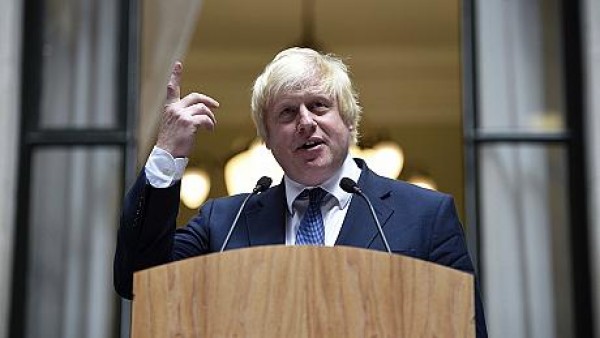Johnson campaigned vociferously for Britain’s departure from the European Union in the run-up to the referendum. In France, a founding EU member, he is seen as having had a decisive influence in a vote which many feel will have negative effects across the continent and on the process of European integration.
‘Irresponsible’…‘a liar’
His new French counterpart was particularly outspoken, accusing Johnson of lying during the EU referendum campaign.
“I am not at all worried about Boris Johnson, but you know his style, his method during the campaign. He lied a lot to the British people and now it is he who has his back against the wall, his back against the wall to defend his country but also with his back against the wall to make this relationship with Europe should be clear,” the French Foreign Minister Jean-Marc Ayrault told Europe 1 radio.
Germany is bound to play a crucial role in the UK’s eventual dealings with the EU over Brexit, although Boris Johnson’s precise role in the future negotiations is not yet clear given the setting up of a new government department separate from the Foreign Office.
After the referendum result Spiegel magazine described Johnson as a “talented populist” who would “end up costing the British a lot of money”.
Speaking less than two hours before Johnson’s appointment, German Foreign Minister Frank-Walter Steinmeier called the former London mayor “irresponsible”.
“It is bitter for Great Britain. People there are experiencing a rude awakening after irresponsible politicians first lured the country into a Brexit to then, once the decision was made, bolt and not take responsibility. Instead they went to play cricket. To be honest, I find this outrageous. But it’s not just bitter for Britain. It’s also bitter for the European Union,” Steinmeier told a meeting of students.
“Astonishing” was how one MEP from Angela Merkel’s CDU party, Kai Whittaker, described Johnson’s appointment.
Speaking onBBCRadio, he said he thought Johnson’s role would be to reach out to other parts of the world as well as Europe, adding that he thought recent “strong messages” by Chancellor Merkel had not been fully understood by the British government.
“There will be no talks whatsoever before Article 50 (of the Lisbon Treaty) is triggered. Secondly there is no cherry picking, so if Britain wants access to the (single) market, it has to agree to EU immigration. And the third thing is it must make a difference whether you are a member of the European Union or not. You can’t have the cake and eat it,” Whittaker said.
‘Plaster off the ceiling’
The man at the centre of the storm said on Thursday that given the referendum result, it was inevitable that there would be “plaster coming off the ceiling in the chancelleries of Europe”.
“It wasn’t the result they were expecting. Clearly they are making their views known in a frank and free way,” Boris Johnson said.
The foreign secretary added that he had received a “charming” note from the French foreign minister, saying that he was looking forward to working together and deepening Anglo-French cooperation.
He also said that Britain could play an even greater role in Europe despite voting to leave the EU, arguing that the United States shared his view.
Putting on a straight face
After congratulating Johnson on his new post, the US Secretary of State John Kerry called for a “sensible and measured” approach to Brexit.
Earlier, US State Department spokesman Mark Toner broke out into a smile when told the identity of Britain’s new chief diplomat, before abruptly reverting to a straight face and suitably diplomatic language in saying that America’s special relationship with the UK went “beyond personalities”.
Sir Christopher Meyer, a former UK ambassador to the US, told Sky News he thought the appointment was “‘bold, imaginative, risky”, but that it could be a “shot of adrenalin” through the British diplomatic system which after Brexit would need to “raise its game around the world”.
He added that Boris Johnson had “cultivated a caricature view of himself” which now presented a challenge that he and the British Foreign Office would “have to deal with”.
Britain’s new chief diplomat has famously described US President Barack Obama as “part Kenyan” who had an “ancestral dislike of the British Empire”, while once likening Hillary Clinton to a “sadistic nurse in a mental hospital”.
Toning it down
Johnson is not alone in having ridiculed Turkey’s President Erdogan, but given his new position he may find himself engaging in some damage limitation – especially following the claim by the “Vote Leave” campaign that “Turkey is joining the EU”, castigated for being negative, inflammatory and plain wrong.
“His negative comments on Erdogan and Turkey are unacceptable,” a senior Turkish official said. “With his new responsibilities we are expecting a more positive attitude from Mr Johnson.”
The new foreign secretary’s supporters argue that as mayor of London he succeeded in raising much investment for the city when travelling the world and singing its praises. Some commentators have felt compelled to defend him against “spiteful attacks”, well before the latest torrent of criticism since he landed his new job.
Sir Christopher Meyer said it was inevitable that commentators worldwide would be “compiling a book of Boris’ gaffes”.
But quite apart from his inauspicious comments in the past, Johnson’s conduct and outspoken attacks on the EU during the referendum campaign surprised diplomats.
Ahead lie months, if not years, of perhaps tortuous negotiations as the United Kingdom tries to unravel more than four decades of European legislation.
One former ambassador said Britain’s new foreign minister – a “big figure, full of showmanship” – would need to become much more disciplined in future.
(By Alasdair Sandford - Reuters – Euronews)

 (Copia).jpg)


